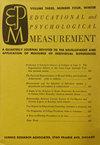努力程度调节评分对多维快速猜测是否稳健?
IF 2.1
3区 心理学
Q2 MATHEMATICS, INTERDISCIPLINARY APPLICATIONS
引用次数: 0
摘要
快速猜测(RG)是一种非努力反应形式,为了减轻快速猜测的潜在破坏性后果,研究人员提出了许多评分方法。本模拟研究考察了这些方法中最流行的单维努力调解(EM)计分程序对多维 RG(即与考生能力呈线性关系的 RG)的稳健性。具体来说,EM 计分与 Holman-Glas(HG)方法(一种多维计分方法)在模型拟合失真、能力参数恢复和欧米茄信度失真方面进行了比较。测试难度、样本中出现 RG 的比例以及能力与 RG 倾向之间的关联强度受到操纵,共产生了 80 种条件。总体而言,研究结果表明,当 RG 占所有项目回答的 12% 或更少时,与 HG 评分相比,EM 评分的模型拟合度更高。此外,在中等程度的 RG 多维性条件下,比较这两种计分方法,在能力参数恢复和欧米茄信度失真方面没有发现明显差异。这些有限的差异主要是由于当样本数据中有多达 40% 的项目回答反映了 RG 行为时,RG 对综合能力(偏差范围在 0.00 至 0.05 logits 之间)和可靠性(失真度小于 0.005 单位)估计值的影响有限。本文章由计算机程序翻译,如有差异,请以英文原文为准。
Is Effort Moderated Scoring Robust to Multidimensional Rapid Guessing?
To mitigate the potential damaging consequences of rapid guessing (RG), a form of noneffortful responding, researchers have proposed a number of scoring approaches. The present simulation study examines the robustness of the most popular of these approaches, the unidimensional effort-moderated (EM) scoring procedure, to multidimensional RG (i.e., RG that is linearly related to examinee ability). Specifically, EM scoring is compared with the Holman–Glas (HG) method, a multidimensional scoring approach, in terms of model fit distortion, ability parameter recovery, and omega reliability distortion. Test difficulty, the proportion of RG present within a sample, and the strength of association between ability and RG propensity were manipulated to create 80 total conditions. Overall, the results showed that EM scoring provided improved model fit compared with HG scoring when RG comprised 12% or less of all item responses. Furthermore, no significant differences in ability parameter recovery and omega reliability distortion were noted when comparing these two scoring approaches under moderate degrees of RG multidimensionality. These limited differences were largely due to the limited impact of RG on aggregated ability (bias ranged from 0.00 to 0.05 logits) and reliability (distortion was ≤ .005 units) estimates when as much as 40% of item responses in the sample data reflected RG behavior.
求助全文
通过发布文献求助,成功后即可免费获取论文全文。
去求助
来源期刊

Educational and Psychological Measurement
医学-数学跨学科应用
CiteScore
5.50
自引率
7.40%
发文量
49
审稿时长
6-12 weeks
期刊介绍:
Educational and Psychological Measurement (EPM) publishes referred scholarly work from all academic disciplines interested in the study of measurement theory, problems, and issues. Theoretical articles address new developments and techniques, and applied articles deal with innovation applications.
 求助内容:
求助内容: 应助结果提醒方式:
应助结果提醒方式:


